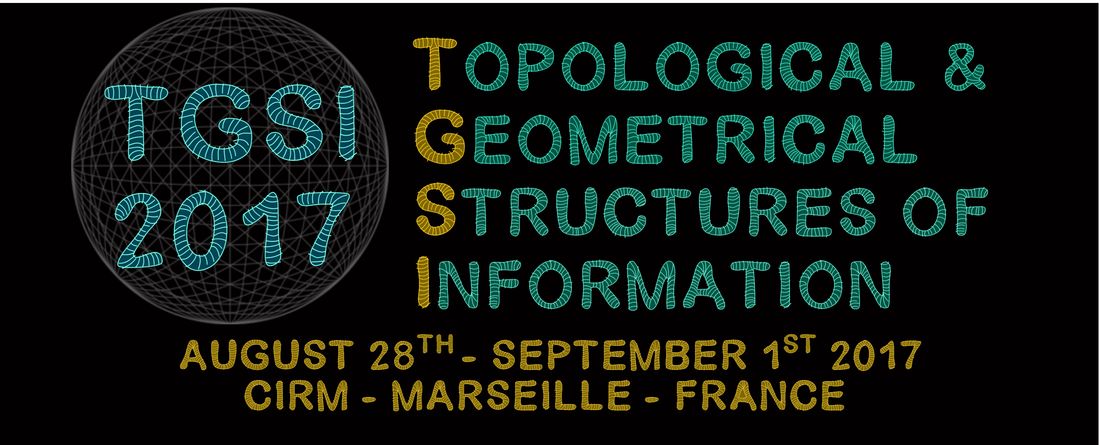Geometrical and Topological Structures of Information
August 28 – 1 September, 2017
|
The proposed conference is dedicated to the geometrical and topological foundations of information theory. It will complement the 2017, 2016, 2015 and 2013 edition of « Geometric science of information » and « Information Geometry and its Applications IV« , by focusing on the advances of entropy and information functions in probability, geometry, homology, algebra, category theory and their expression in physics and data analysis.
There have been rapid recent developments in several different research communities in this connection, with little interaction between them, and one of the goals of the conference is to bring these communities in contact. In statistics, although analysis of the geometric structure of statistical manifolds (i.e., manifolds formed by some families of probability distributions) has its roots in the work of Cramér, Rao and Fisher in the 1940’s, it saw much development in the 1980’s through Amari and others. On the other hand, the algebraic geometry of statistical models began to be studied more recently by Sturmfels and others. The recent development of such algebraic and geometric methods (based on differential geometry or other kinds of geometric structure) has transformed the fields of machine learning and Bayesian statistics. The conference will review many of these new developments, involving the interplay of information and algebraic and differential geometry, number theory, probability and homology. It will emphasize the richness and diversity of information approaches and principles that arose in mathematics, physics, and statistical data analysis. The conference schedule will be organised around half-day and day sessions, covering one central topic. Introductory courses open to students will be proposed at the beginning of the sessions, then completed by more specialized one-hour presentation. Finally, discussion sessions that tackle open questions and future development lines will also take place. |
Organizing and Scientific Committee
Stéphanie Allassonnière (CMAP X, France) |
Organisers: Michel Ledoux (Institut de Mathématiques de Toulouse, France), Mokshay Madiman (University of Delaware, USA)
Mini-course: Mokshay Madiman (University of Delaware, USA)
Speakers: Thomas Courtade (University of California, Berkeley, USA), Nathael Gozlan (Université Paris-Est, France), Oliver Johnson (University of Bristol, UK), Jan Maas (IST, Austria), Karl-Theodor Sturm (Institut für Angewandte Mathematik, Germany)
Abstract: This session will explore the geometry of particular instances as well as general classes of metric measure spaces as captured using the notion of entropy.
Organisers: Pierre Baudot (INSERM, Fance), Daniel Bennequin (Université Paris Diderot, France), Michel Boyom (Université du Languedoc-Montpellier II, France), Herbert Gangl (Durham University, UK), Matilde Marcolli (Caltech, USA), John Terilla (Queens College, USA).
Speakers: Daniel Bennequin (Université Paris Diderot, France), José Ignacio Burgos Gil (ICMAT, Spain), Michel Boyom (Université du Languedoc-Montpellier II, France), Philippe Elbaz-Vincent (Institut Fourier, France), Tom Leinster (University of Edinburgh, UK), Matilde Marcolli (Caltech, USA), John Terilla (Queens College, USA).
Abstract: Arising from polylogarithmic functional equation, tropical semirings and probability theory studies, this session will adress the progresses acheived in caracterising the topology associated to information and probability theory, notably expressing some features of motive and operad.
Organisers: Frédéric Barbaresco (Thales, France), Joël Bensoam (IRCAM, France)
Speakers: Frédéric Barbaresco (Thales, France), Joël Bensoam (IRCAM, France), François Gay-Balmaz (LMD-ENS, France), Frédéric Hélein (Université Paris-Diderot, France), Bernhard Maschke (Claude Bernard University, France)
Abstract: This session will address methods of variational calculus combined with stochastic analysis, Multi-Symplectic Geometry and Lie Group theories to study foundations of Stochastic Geometric Mechanics and Lie Group Thermodynamics.
Organisers: Dominique Spehner (Institut Fourier, France)
Speakers: Madalin Guta (University of Nottingham, UK), Dominique Spehner (Institut Fourier, France), Karol Zyczkowski (Jagiellonian University, Poland)
Abstract: The aim of this session is to explore the different Riemannian geometries that can be used to describe and quantify quantum correlations in composite quantum systems, together with their operational interpretations in quantum information theory.
Organisers: Carlo Rovelli (Centre de Physique Theorique de Luminy, France)
Speakers: Livine Etera (Laboratoire de Physique, ENS Lyon, France), Antonino Marcianò (Fudan University, China), Carlo Rovelli (Centre de Physique Theorique de Luminy, France)
Abstract: The objective of the session is to make the point on the way geometry and quantum correlations are related in quantum gravity. The focus would be on the recent developments in the possibility of describing quantum states of the geometry with long distance correlations.
Organisers: Stéphanie Allasonnière (Paris V University, France), Xavier Pennec (INRIA sophia, France)
Mini-course: Xavier Pennec (INRIA sophia, France), Alain Trouvé (ENS Cachan, France)
Speakers: Marc Arnaudon (IMB, France), Aasa Feragen (DIKU, Denmark), Stanley Durrleman (ARAMIS lab, France), Ian Dryden (University of Nottingham, UK).,
Alice Le Brigant (IMB, Université de Bordeaux, France)
Abstract: This session presents recent progresses in geometric statistics. In many applications domains such as computational anatomy and phylogenetics, computer vision, structural biology, one models data as elements of a manifold which is quotiented by a proper and isometric Lie group action (a shape space).
Organisers: Nihat Ay (MPI-MIS, Germany), František Matúš (Institute of Information Theory and Automation, Czech Republic)
Speakers: Nihat Ay (MPI-MIS, Germany), Tobias Fritz (Perimeter Institute, Canada), Luigi Malago (RIST, Romania), František Matúš (Institute of Information Theory and Automation, Czech Republic), Guido Montúfar (MPI-MIS, Germany), Johannes Rauh (Leibniz Universität, Germany), Milan Studený (Institute of Information Theory and Automation, Czech Republic)
Abstract: This session will review the role in network analysis within the fields of artificial intelligence and machine learning, of geometric objects defined in terms of information equalities as well as information inequalities.


